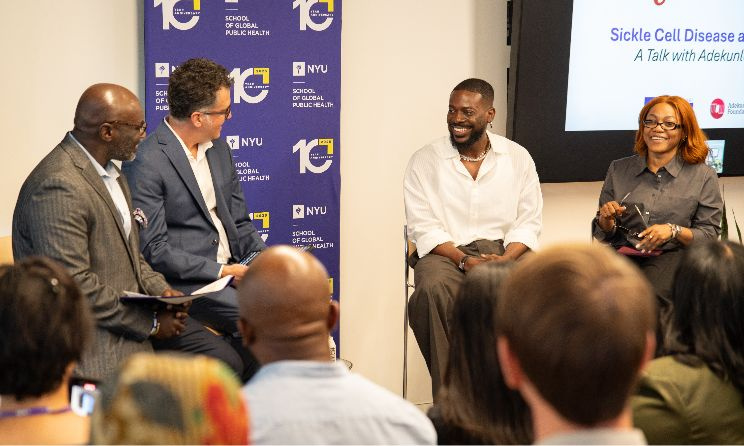NYU, Adekunle Gold launch collaboration on sickle cell awareness
New York University (NYU) researchers have partnered with Nigerian singer and songwriter Adekunle Gold to address stigma and build awareness around sickle cell disease, an inherited blood disorder that causes red blood cells to become sickle-shaped, leading to anaemia, blockages in blood flow, organ damage, and severe pain crises.
 Nigerian artist Adekunle Gold (second from right) visited NYU School of Global Public Health to launch a research collaboration, BEAT-SCD. He spoke with NYU professors Emmanuel Peprah (left) and Carlos Chirinos (second from left), along with Elizabeth Sobowale (right) of the Adekunle Gold Foundation. Photo: NYU Photo Bureau
Nigerian artist Adekunle Gold (second from right) visited NYU School of Global Public Health to launch a research collaboration, BEAT-SCD. He spoke with NYU professors Emmanuel Peprah (left) and Carlos Chirinos (second from left), along with Elizabeth Sobowale (right) of the Adekunle Gold Foundation. Photo: NYU Photo Bureau
The initiative, known as BEAT-SCD (Building Engagement Through Music Artistry and Storytelling for Sickle Cell Disease), was launched on 11 September at NYU’s School of Global Public Health as part of National Sickle Cell Awareness Month in the US. It aims to use music and storytelling to foster public engagement, counter misconceptions, and support people living with the condition.
The collaboration is led by NYU professors Carlos Chirinos and Emmanuel Peprah, working alongside the Adekunle Gold Foundation. At the launch, Gold spoke with students about his personal experience of living with the inherited blood disorder.
Sickle cell disease affects nearly eight million people worldwide. It is caused by abnormal red blood cells that become rigid and crescent-shaped, which can obstruct blood flow and result in severe pain, anaemia, infections, stroke and, in some cases, death. The condition is most prevalent among people of African, Mediterranean, Middle Eastern and Indian descent, with around 80% of cases occurring in sub-Saharan Africa. In the US, more than 100 000 people are affected.
Beyond the medical challenges, individuals with sickle cell disease often face stigma from communities and healthcare providers, who may hold misconceptions about the illness or misinterpret pain crises as drug-seeking behaviour. Researchers say this contributes to barriers in accessing treatment and impacts mental health.
Gold publicly disclosed his diagnosis in 2022 through his music, referencing his condition in the single ‘5 Star’. Since then, he has used his platform to raise awareness and share his experience of managing the disease.
Chirinos, an assistant professor of music at NYU Steinhardt, described Gold as “a powerful storyteller” whose work brings attention to the lived experiences of people with sickle cell disease. Peprah, associate professor of global and environmental health at NYU, added that highlighting personal stories can strengthen advocacy, research and policy responses.
As part of the project, NYU researchers will conduct a global survey on public perceptions of sickle cell disease, as well as the experiences of those affected. The findings will be used to design interventions that employ music as a tool for public education and awareness.
In addition to research, the collaboration will create spaces for dialogue with global health professionals. Gold has previously shared his perspective at international platforms, including a World Health Organization webinar earlier this year ahead of the UN General Assembly High-Level Meeting on Mental Health and Non-Communicable Diseases.
The project forms part of NYU’s Arts & Impact initiative, which examines how art can be used to drive social change. It is supported by an NYU Research Catalyst Grant.




























Comments
Log in or register to post comments